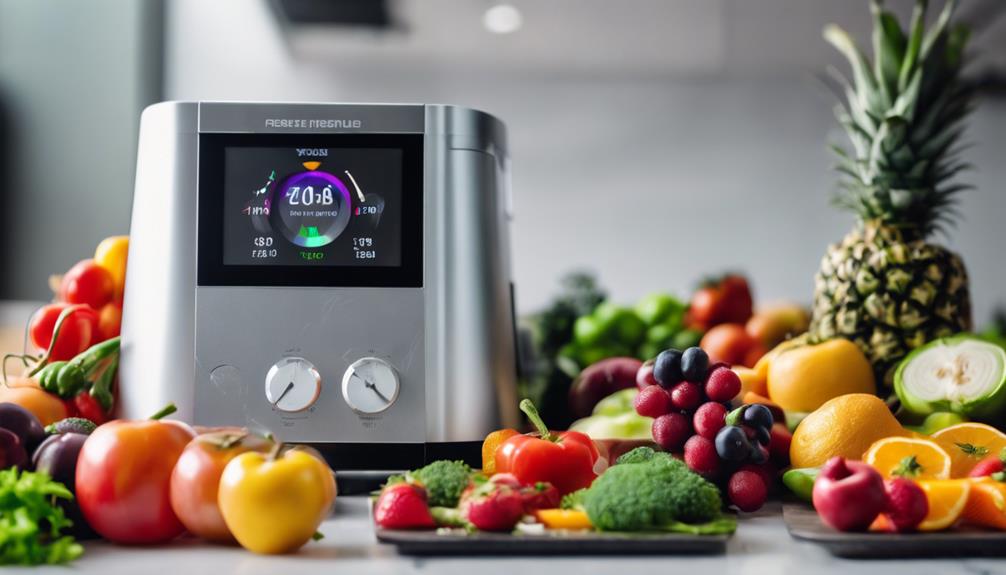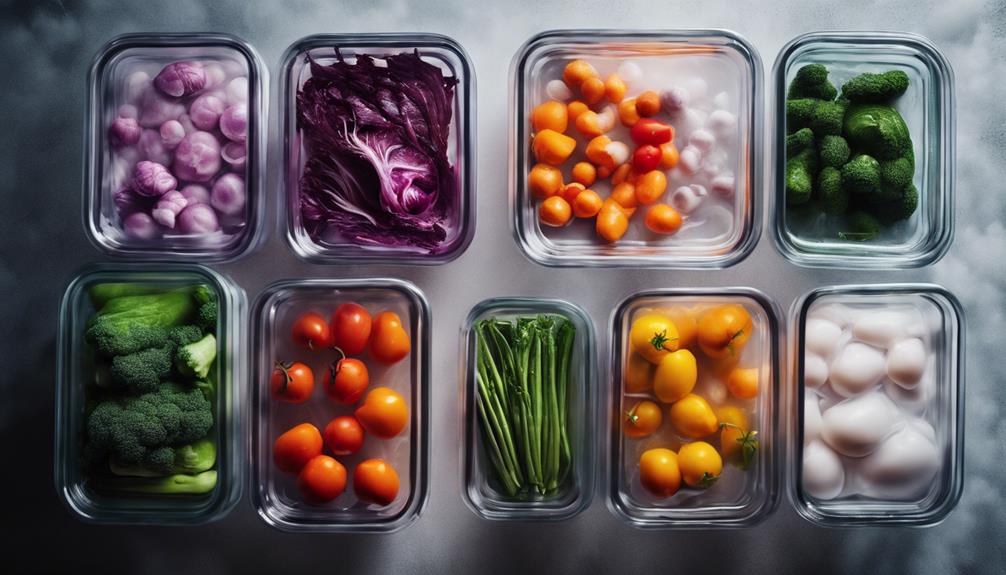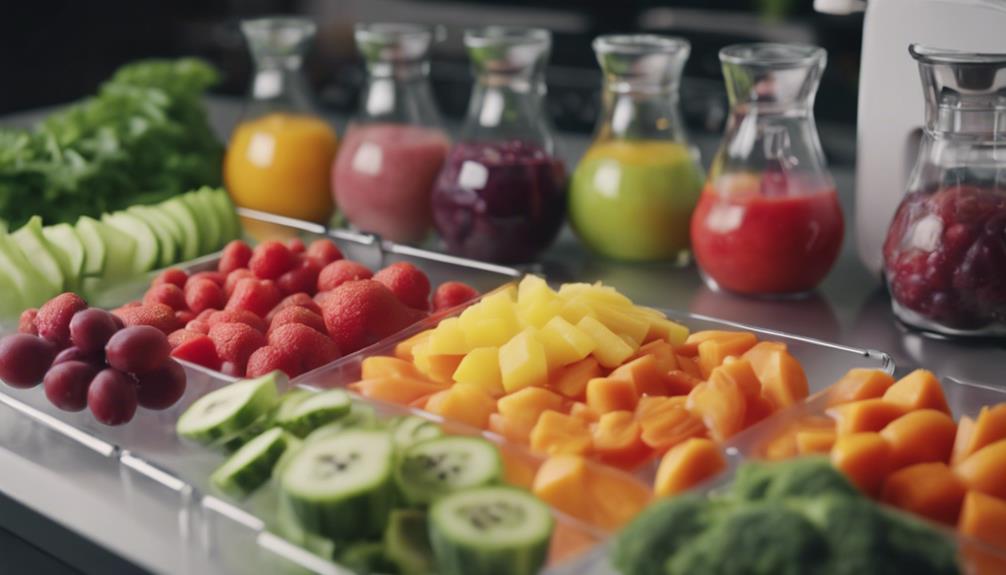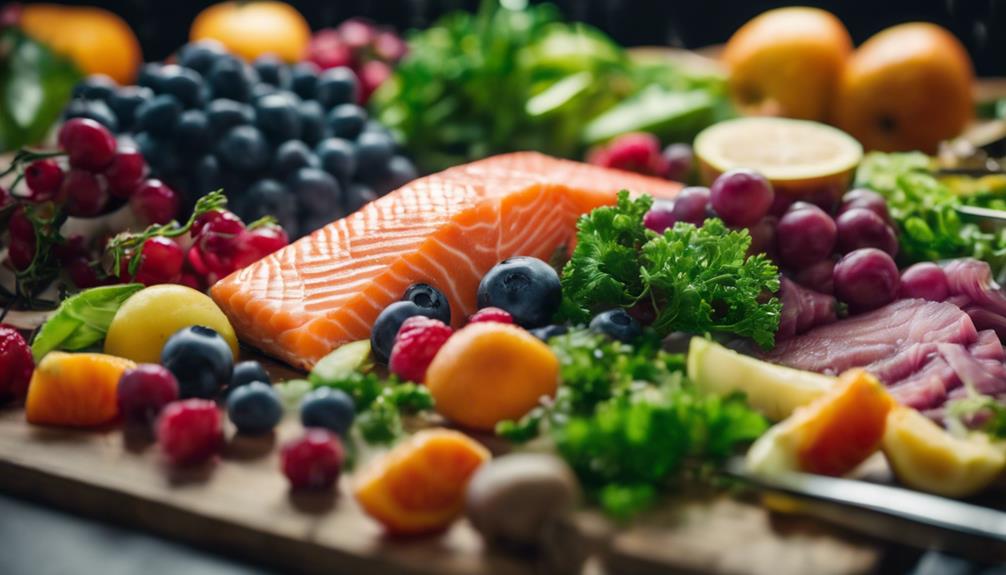Nourishing the Brain: Exploring the MIND Diet With Sous Vide for Optimal Health
Enhance your brain health by embracing the MIND diet with sous vide cooking. Prioritize foods like green leafy vegetables, berries, nuts, fish, and olive oil for cognitive support. Sous vide's precise cooking at low temperatures preserves nutrients and intensifies flavors. Fatty fish, nuts, avocado, herbs, and spices enhance brain function. Experiment with colorful, nutrient-dense meals. Nourish your body with whole foods, exercise regularly, and manage stress for peak well-being. Quality sleep and mindful eating further support cognitive health. Learn how this powerful combination can benefit your brain and overall health.
What You Will Learn Here
- MIND Diet's focus on brain-nourishing foods boosts cognitive function.
- Sous vide cooking preserves nutrients and enhances flavors for brain health.
- Nutrient-dense foods like fatty fish, nuts, and superfoods support optimal brain function.
- Herbs like rosemary and turmeric add flavor and brain-boosting properties to meals.
- Embracing a healthy lifestyle with good nutrition, exercise, and stress reduction benefits brain health.
The MIND Diet Overview
Explore the fundamental principles of the MIND Diet, a nutritional approach designed to promote brain health and cognitive function. The MIND Diet, which stands for 'Mediterranean-DASH Diet Intervention for Neurodegenerative Delay,' combines aspects of the Mediterranean diet and the DASH (Dietary Approaches to Stop Hypertension) diet. This diet focuses on consuming specific foods that have been scientifically linked to improved brain health and cognitive function.
By following the Mind diet principles, you prioritize foods such as green leafy vegetables, berries, nuts, whole grains, fish, poultry, olive oil, and wine. These choices are associated with numerous health benefits, including reducing inflammation, providing antioxidants, and supporting overall brain function. Healthy eating through the MIND Diet can help lower the risk of developing conditions like Alzheimer's disease and dementia.
Embracing the MIND Diet not only offers nutrition benefits but also empowers you to make conscious choices that support your brain health and cognitive function in the long run. By incorporating these principles into your daily meals, you're taking proactive steps towards enhancing your overall well-being.
Importance of Brain-Nourishing Foods
Brain-nourishing foods play a pivotal role in supporting cognitive function and overall brain health, aligning with the core principles of the MIND Diet. Including memory-enhancing foods like blueberries and walnuts in your diet can aid in cognitive support by safeguarding brain cells from damage and reducing inflammation. Foods rich in omega-3 fatty acids such as salmon and flaxseeds contribute to brain health by promoting ideal brain structure and function. Additionally, incorporating dark leafy greens like spinach and kale can help improve focus and mental clarity due to their high content of antioxidants and vitamins.
Choosing a variety of brain-nourishing foods is essential for maintaining cognitive function and supporting overall brain health. By including these foods in your diet, you can enhance memory, improve focus, and promote cognitive support. Prioritizing brain-nourishing foods not only benefits your brain health in the present but also plays an essential role in preserving cognitive function as you age.
Sous Vide Cooking Basics

Explore the fundamentals of sous vide cooking to master this precise and innovative culinary technique. Sous vide, which means 'under vacuum' in French, involves cooking food in a precisely controlled water bath at a consistent low temperature. This method offers exceptional benefits such as temperature control, allowing you to cook your food to the exact degree of doneness desired.
One of the key advantages of sous vide is flavor infusion. By sealing ingredients in a vacuum-sealed bag, the flavors and aromas intensify, resulting in a more vibrant and rich taste. Additionally, sous vide cooking is known for its time efficiency. Once you set the temperature and timer, you can walk away without the need for constant monitoring.
Texture retention is another standout feature of sous vide. By cooking food in a controlled environment, you can achieve perfectly tender and juicy results. Finally, sous vide is incredibly versatile, allowing you to cook a wide range of foods from meats and vegetables to desserts with precision and consistency. Mastering these basics will set you on a path to creating delicious and healthy meals with ease.
Benefits of Sous Vide for Health
Discover the numerous health benefits of sous vide cooking, enhancing both nutrition and overall well-being through its precise and controlled cooking method. Sous vide benefits encompass a range of advantages that contribute to a healthier lifestyle, from improved nutrient preservation to enhanced brain nourishment.
Here are some key health advantages of this cooking technique:
- Nutrient Preservation: By cooking food in a sealed bag at precise temperatures for an extended period, sous vide helps retain more vitamins and minerals compared to traditional cooking methods.
- Enhanced Flavor: The sealed environment of sous vide cooking allows ingredients to marinate in their own juices, resulting in more flavorful dishes without the need for excess fats or salts.
- Improved Digestibility: The gentle cooking process of sous vide breaks down proteins and fibers, making food easier to digest and absorb essential nutrients.
- Reduced Risk of Overcooking: With sous vide, there's minimal risk of overcooking, ensuring that your meals are perfectly cooked and retain their nutritional value.
Integrating MIND Diet With Sous Vide

When integrating the MIND diet with sous vide cooking, you enhance the potential to optimize brain health through a combination of nutrient-rich ingredients and precise cooking techniques. By embracing sous vide techniques, you can lock in essential nutrients and flavors, promoting mindful eating habits that contribute to brain-boosting benefits. This culinary innovation allows for a seamless fusion of wellness and taste, making it easier for you to follow the MIND diet and savor delicious dishes that support cognitive function.
To better understand the integration of the MIND diet with sous vide, let's explore a table highlighting key aspects of this wellness fusion:
| Sous Vide Techniques | Mindful Eating | Brain Boosting | Culinary Innovation | Wellness Fusion |
|---|---|---|---|---|
| Precise temperature control | Focus on flavors and textures | Nutrient-dense ingredients | Creative recipe development | Promotes overall health |
Enhancing Cognitive Function
Enhancing cognitive function can be achieved through the strategic incorporation of nutrient-dense foods and cooking techniques that support brain health. To optimize your memory enhancement, cognitive performance, neurological health, focus, and concentration, consider the following:
- Include Omega-3 Fatty Acids: Omega-3s are vital for brain health, supporting cognitive function and memory.
- Prioritize Antioxidant-Rich Foods: Antioxidants protect your brain cells from damage and help enhance neurological health.
- Embrace Whole Grains: Whole grains provide a steady release of energy, supporting focus and concentration throughout the day.
- Integrate Brain-Boosting Nutrients: Nutrients like Vitamin E, Vitamin K, and folate are essential for brain health and cognitive function.
Nutrient Retention in Sous Vide

For peak nutrient retention in sous vide cooking, it's crucial to understand the impact of this precise cooking method on the preservation of essential nutrients in foods. Sous vide cooking involves sealing ingredients in a vacuum-sealed bag and cooking them in a water bath at a precise temperature for an extended period. This gentle cooking technique helps maintain more vitamins and minerals compared to traditional methods that expose food to higher temperatures for a shorter duration.
Sous vide benefits nutrient preservation by minimizing nutrient loss through exposure to high heat or water during cooking. The controlled environment guarantees that essential vitamins and minerals are retained, promoting a healthier diet. Additionally, this method allows for flavor infusion, as ingredients are cooked in their juices, enhancing taste without the need for excessive salt or fats.
Recipes for Brain Health
To optimize brain health through your diet, incorporating nutrient-rich recipes can be a beneficial approach. When focusing on recipes for brain health, consider these key elements:
- Memory Boosting Ingredients: Including foods like blueberries, fatty fish rich in omega-3 fatty acids, and nuts such as walnuts can help enhance memory and cognitive function.
- Flavorful Combinations: Experiment with herbs like rosemary, turmeric, and cinnamon to add both flavor and brain-boosting properties to your dishes.
- Quick Prep Options: Opt for recipes that are easy and quick to prepare, such as smoothie bowls with berries, seeds, and yogurt or simple stir-fries with vegetables and lean proteins.
- Superfood Pairings: Combine different superfoods like avocado, kale, quinoa, and dark chocolate to create nutrient-dense meals that support overall brain health.
Meal Planning Tips

Consider incorporating a variety of nutrient-dense foods into your weekly meal plan to support peak brain health and cognitive function. When planning your meals, focus on ingredient selection, portion control, flavor combinations, meal prep, and mindful eating. Here are some tips to help you create a well-rounded meal plan:
| Meal Planning Tips | Description |
|---|---|
| Ingredient Selection | Choose a variety of colorful fruits and vegetables rich in antioxidants like berries, leafy greens, and tomatoes. Include fatty fish high in omega-3s such as salmon and sardines. |
| Portion Control | Be mindful of portion sizes to maintain a balanced diet. Use smaller plates, measure servings, and avoid eating directly from packages to prevent overeating. |
| Flavor Combinations | Experiment with herbs, spices, and healthy fats like olive oil to enhance the taste of your meals without relying on excess salt or sugar. |
| Meal Prep | Plan and prepare meals in advance to save time and ensure healthier choices throughout the week. Sous vide cooking can help retain nutrients and flavors. |
| Mindful Eating | Slow down, savor each bite, and pay attention to hunger and fullness cues to prevent overeating and promote better digestion. |
Embracing a Healthier Lifestyle
What steps can you take to shift towards a healthier lifestyle that supports your overall well-being and cognitive function?
To embrace a healthier lifestyle that nurtures both your body and mind, consider the following:
- Mindful Eating: Focus on nourishing your body with whole, nutrient-dense foods. Practice mindful eating by savoring each bite, paying attention to your body's hunger and fullness cues, and choosing foods that support brain health.
- Exercise Routine: Engage in regular physical activity that you enjoy, whether it's yoga, walking, dancing, or strength training. Aim for at least 150 minutes of moderate-intensity exercise per week to boost your mood, energy levels, and cognitive function.
- Stress Management: Implement stress-reducing techniques such as deep breathing, meditation, journaling, or spending time in nature. Chronic stress can negatively impact your brain health, so finding healthy ways to manage stress is essential.
- Sleep Hygiene: Prioritize quality sleep by establishing a relaxing bedtime routine, creating a comfortable sleep environment, and aiming for 7-9 hours of restful sleep each night. Quality sleep is essential for cognitive function and overall well-being.
Frequently Asked Questions
Can the MIND Diet Be Effective for Individuals With Specific Dietary Restrictions or Food Allergies?
If you have dietary restrictions or allergies, fear not! The MIND diet can still work for you. Allergen substitutions, alternative proteins, customized recipes, ingredient swaps, and dietary modifications can tailor the plan to suit your needs effectively.
How Can Sous Vide Cooking Be Adapted for a Vegetarian or Vegan MIND Diet?
To adapt sous vide for a vegetarian or vegan MIND diet, explore plant-based adaptations like tofu, tempeh, or seitan. Utilize vegan alternatives such as plant-based cheeses and dairy-free sauces. Experiment with meatless options for protein and vegetarian substitutions for a diverse culinary experience.
Are There Specific Cooking Techniques or Tips for Maximizing Nutrient Absorption From MIND Diet Foods When Using Sous Vide?
To maximize nutrient absorption from MIND diet foods using sous vide, consider these tips: Sous vide techniques retain nutrients, enhancing brain nourishment. Peak health and cognitive function benefit from maximizing nutrition through sous vide cooking methods.
Can Sous Vide Cooking Help Individuals With Neurodegenerative Conditions Improve Their Cognitive Function?
Sous vide cooking can enhance cognitive function in individuals with neurodegenerative conditions by preserving nutrients vital for brain health. This technique optimizes nutrient absorption, supporting overall brain health and potentially aiding in cognitive enhancement.
Are There Any Potential Risks or Concerns to Be Aware of When Combining the MIND Diet With Sous Vide Cooking for Brain Health?
When combining the MIND diet with sous vide for brain health, potential risks include foodborne illness if not cooked properly. Safety precautions like ensuring proper cooking temperatures are crucial. This method maintains nutrient retention, supporting cognitive function.
Conclusion
To sum up, integrating the MIND diet with sous vide cooking can be an efficient way to nourish your brain and promote peak health.
By concentrating on nutrient-dense foods and employing the gentle cooking method of sous vide, you can guarantee that you're maximizing the retention of essential vitamins and minerals.
With proper meal planning and dedication to a healthier lifestyle, you can support cognitive function and overall well-being for years to come.











